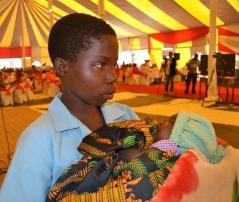
The battle against teen pregnancies and early marriages is far from being won as reports from several parts of Malawi show that many girls are dropping out of school due to the problem.
In one typical case, a Malawi News Agency report has shown that only 11 girls out of 50 who were enrolled in Form One are scheduled to sit for this year’s Malawi School Certificate of Education (MSCE) examinations [an equivalent of General Certificate of Education O-level) at Lirangwe Community Day Secondary School (CDSS) in Blantyre after the rest dropped out largely because of pregnancies and early marriages.
A councillor in Malawi’s commercial city of Blantyre Akima Chipwatali bemoaned the problem.
“Of the 50 girls who were selected to Lirangwe CDSS four years ago, only 11 will write their MSCE as the rest have dropped out due to early marriages and unplanned pregnancies,” she said.
Head teacher for the school Stanly Maseko confirmed the high dropout rate to the state news agency.
“It is indeed true that out of the 50 girls that started form one here in 2014, only 11 are still schooling and will sit for this year’s MSCE,” he explained.
Even though he admitted that most of the drop-outs were because of early marriages and unplanned pregnancies, he did not rule out other factors as well.
“The major causes of the dropouts are early marriages and unplanned pregnancies but some might have transferred to schools with boarding facilities while some are because they failed in the Junior Certificate Examinations,” Maseko said.
Blantyre District Community Development Officer, Agness Napwanga said the development showed that most of the secondary school girls in this community were sexually active.
“It is very difficult for us to go and start telling the girls to be using contraceptives like condoms as they are said to promote promiscuity and the education policy does not allow us,” she said.
Marriage Age
Parliament in Malawi recently passed a landmark bill that amended the Constitution to harmonise the age of a child with other relevant laws thereby securing the protection of children against early marriage.
There has been an outcry amongst Malawians led by civil society organisations that Section 14 of the Marriage, Divorce and Family Relations Act of 2015 which put the age of marriage at 18 was in conflict with the Constitution, which put the age of a child at 16.
Section 23 of the Constitution exposed children aged between 16 and 18 to harmful cultural practices such as early marriage, according to Minister of Justice and Constitutional Affairs Samuel Tembenu.
Following the passing of the Constitution (amendment) bill, Malawi becomes in compliance with the African Charter and United Nations Convention on the Rights of the Child which provides that a child is aged 18 and below and must be accorded all the protection by the State and its instruments.
“The age of marriage is an issue that Malawians have spoken strongly about. When there is a law against children getting married before they are 18, more children will go to school, there will be less children dying before they are one year old and these will participate in the development of the country,” said opposition lawmaker Jessie Kabwila.
Apart from the Constitution and Marriage Act, another legislation which protects the child in Malawi is the Child Care, Protection and Justice Act enacted in 2010.
According to the 2015/16 Demographic Health Survey, 29 percent of adolescents aged 15 to 19 in Malawi have begun having children, especially those in the rural areas where education facilities are poor resulting in high dropout rates.
“More than half of teenagers age 15 to 19 (54 percent) with no education have begun childbearing compared with 32 percent of teenagers who have attained primary education and 19 percent of those who have attained the secondary education,” the DHS reads.
According to United Nations Populations Fund, globally, complications of pregnancy are the second leading killer of girls aged 15 to 19.
Solutions
Meanwhile a number of initiatives are underway to end child marriages in Malawi. Some of the initiatives are being implemented by traditional leaders.
One of the chiefs who has established herself as a gallant fighter in prevention of child marriages is Inkosi Theresa Kachindamoto of central Malawi’s district of Dedza.
She has established by-laws in her area of jurisdiction which have resulted in dissolution of over 850 child marriages.
She says her decision to take a stand came from her frustration over seeing 12-year-old girls walking around with babies on their hips.
Kachindamoto also annul any existing underage unions, and to send all the girls involved back to school.
“I don’t want youthful marriages. Children must be at school and not in marriage,” she said.
Kachindamoto is not alone as many other chiefs are doing the same.
